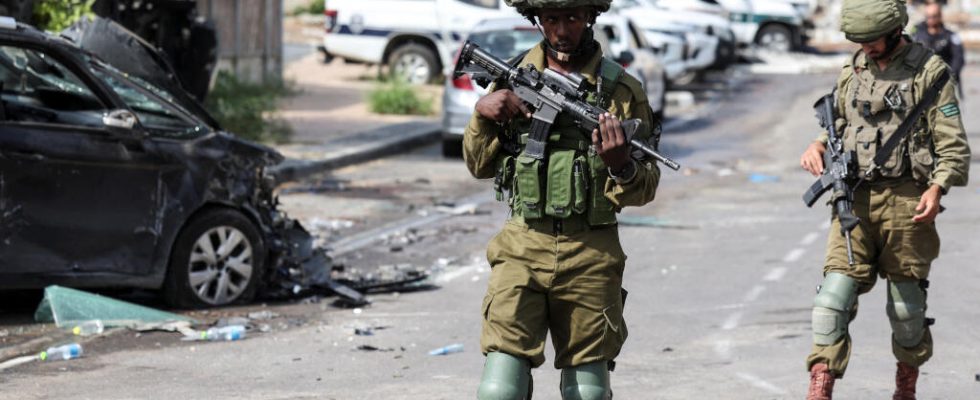“ Hamas attacks: hundreds of infiltrators still in Israel “, title Le Parisien Dimanche, repeating the words of an Israeli army spokesperson who specifies: “ we are fighting against terrorists who came to Israel by air, sea and land “. The newspaper collected the testimony of Maia, who lives north of Tel Aviv: “ I am 46 years old, I have always lived in Israel, but I have never experienced anything like this… Even my mother, who experienced the Yom Kippur War in 1973, tells me that she has never saw that. »
In The Sunday Journallawyer Arno Klarsfeld believes that “theIsraelis are experiencing their September 11th “. “ Hamas terroristshe said, wanted to symbolically reiterate the surprise attack on Yom Kippur on October 6, 1973, where Israel came close to a defeat which would have resulted in the end of the Jewish State. » But the lawyer adds: “ this attack by Hamas is also an act of desperation against Israel which is at peace with Egypt, Jordan and maintains diplomatic relations with many other Arab states and is beginning to be accepted by many states in the Middle East. »
Israeli secret services outdated
“ An incredible failure “, title The Parisian including security consultant Pierre Servent, poses a hypothesis: “ Could the rifts that have been going through Israeli society for several months over the judicial and institutional reform carried out by the right-wing and far-right government have parasitized the work of the Israeli secret services?» As for the help Hamas may have received to carry out this major attack, the security expert has little doubt: “ I can not seehe said, how Hamas with its own small means and on a territory as big as a pocket handkerchief could have constituted such a war stock and had information to attack barracks, without external help “. For him, the most likely hypothesis is that Iran provided aid to Hamas.
A newcomer in the Sunday press
It is La Tribune Sunday which comes out today for the first time and which headlines: “ The war that astonishes “, with the photo of a Palestinian taking a selfie in front of an Israeli tank. “ Executions of civilians, hostage-taking, rocket attacks, lists the newspaper which also speaks of a “ Israeli September 11 » et describes the images circulating on social networks. Images « unbearable horrors of soldiers and civilians killed in a pool of blood, but also those of prisoners, lying on the ground, hands tied, haggard under the harsh light of the cameras. »
Nagorno-Karabakh
“ The Armenian Stations of the Cross “, title Paris Match, which publishes a photo report on the desperate flight of the Armenians. We see a young woman surrounded by four children, as her only luggage, she is carrying a small pink plastic bag. There are also these men and women, sometimes very old, crammed into the trailer of a truck…
“ Armenia: Civilization in Danger “. It’s the front page of Le Point this week. “ Ethnic cleansing before our eyes », Adds the weekly, which devotes around twenty pages to the war led and won by Azerbaijan in Nagorno-Karabakh. The essayist and philosopher Pascal Bruckner fears a new “genocide” and deplores the attitude of the international community. “ Armenia extends its hand to us but we turn our heads », he writes. “ Brussels is negotiating gas and oil with the tyrant of Baku, so that our populations do not shiver this winter….”.
“ What if Europe stopped looking elsewhere? » adds the Express. “ Some will say that she cannot be on all fronts, at a time when her support for Ukraine is becoming more difficult to get the population to accept. Is this a reason not to act? » « No », ton the Expresswhich suggests“ freeze the funds of Aliyev (the Azerbaijani head of state) and his family, deposited abroad and which amount to billions of dollars “.
A thousand-year-old history
The weekly the Obs asked the philosopher and historian Michel Marian. For him, ” the province of Nagorno-Karabakh is invested with a very strong symbolic value: Armenian since Antiquity, it is the one which has preserved a form of sovereignty for the longest, because it was Armenian princes who reigned there until the end of the 18th century “. For the historian, there is no doubt: “ The fact that Karabakh ceases to be Armenian after two millennia of existence constitutes a great shock. »
